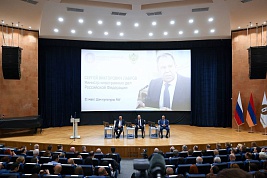Statement by the Ministry of Foreign Affairs of the Russian Federation on the occasion of the 50th anniversary of the entry into force of the Biological and Toxin Weapons Convention
26 March 2025 marks the 50th anniversary of the entry into force of the Convention on the Prohibition of the Development, Production and Stockpiling of Bacteriological (Biological) and Toxin Weapons and on their Destruction (BTWC). The Russian Federation, as one of its initiators and depositaries, congratulates all States Parties to the Convention on this momentous occasion.
The BTWC became the first international legally binding instrument to outlaw an entire category of weapons of mass destruction. For half a century of its existence, the Convention has contributed significantly to the process of general and complete disarmament, reducing the risks of the use of biological agents and toxins for military purposes. The BTWC still remains one of the fundamental pillars in the sphere of international security, and its importance has been steadily increasing in the current realities. The COVID-19 pandemic demonstrated the scale and nature of possible negative consequences of activities with dangerous pathogens and toxins, as well as their potential use as biological weapons.
It is unfortunate that 50 years after the entry into force of the BTWC we cannot say that the problem of biological weapons is completely removed from the international agenda. Risk factors include the potential inappropriate use of rapidly developing biotechnologies, transboundary nature of biological threats, and the possible use of biological agents and toxins as weapons by terrorists. The military biological activities of some states outside their national territories which is conducted under a specious excuse of cooperation «for preventive and other peaceful purposes» and raises serious questions in the context of compliance with the BTWC is equally disturbing.
Today efforts for universalization and strengthening of the BTWC regime are more required than ever before. As main priorities in this area we consider the development of a universal legally binding and non-discriminatory Protocol to the Convention with an effective verification mechanism, as well as strict compliance of the State Parties with their obligations under the BTWC at national level.
In order to strengthen the institutional framework of the Convention, the Russian Federation proposed a number of specific initiatives, such as the creation of mobile biomedical units within the BTWC to provide assistance in case of the use of biological weapons and to contribute to combating epidemics of various origins, the establishment of a Scientific Advisory Committee and a mechanism to investigate alleged violations of obligations under the Convention, the improvement of confidence-building measures through providing by the State Parties to the BTWC with information on military biological activities outside their national territories.
In the context of strengthening the BTWC we emphasize the particular importance of achieving tangible results within the framework of the relevant specialized Working Group established at the BTWC Ninth Review Conference. We are convinced that only decisions taken collectively on the basis of consensus could credibly guarantee faithful compliance with the Convention, as well as prevent the development and the use of biological weapons. At the same time it is important to avoid any artificial restrictions for the development of biological technologies for civil purposes as well as for international cooperation, as envisaged in the relevant provisions of the BTWC.
